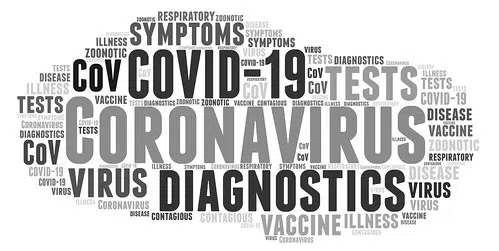Illinoisans Cautioned to Remain Vigilant to Protect Those Most At-Risk
 CHICAGO, IL-(Effingham Radio)- The Illinois Department of Public Health (IDPH) announced today that the CDC is reporting 20 counties in the state are at an elevated level for COVID-19, compared to 28 in the previous week. No Illinois counties are at High Community Level this week compared to three last week, while 20 Illinois counties are at a Medium Community Level, compared to 25 the previous week.
CHICAGO, IL-(Effingham Radio)- The Illinois Department of Public Health (IDPH) announced today that the CDC is reporting 20 counties in the state are at an elevated level for COVID-19, compared to 28 in the previous week. No Illinois counties are at High Community Level this week compared to three last week, while 20 Illinois counties are at a Medium Community Level, compared to 25 the previous week.The updated data comes days after Illinois marked three years since the first reported case of COVID-19 on January 24, 2020. Since that first case, IDPH has recorded a total of 4,019,768 cases and 36,091 deaths, in 102 counties in Illinois. IDPH is reporting 10,924 new confirmed and probable cases of COVID-19 in Illinois in the week ending January 22, and 86 deaths.
“It is good news that COVID-19 community levels are continuing to decline in Illinois, with no counties listed at high level,” said IDPH Director Dr. Sameer Vohra. “We are seeing a gradual increase in the rate of the XBB.1.5 ‘Kraken’ variant in the Midwest and Illinois compared to last week. At this moment, it is not leading to an increase in hospitalizations. Concerns remain about this variant, but new data released by the CDC shows that the updated bivalent COVID-19 booster is protective against it – reducing the risk of symptoms by nearly half. We ask Illinoisians to remain vigilant and use readily available tools like vaccines and antiviral treatments to avoid hospitalizations and protect the most vulnerable.”
Access to tests and treatments can be found at the following test to treat site or by contacting your provider for treatment options, within 5 days of feeling ill.
IDPH is helping Illinoisans prepare for the fall and winter surge of COVID-19 cases by offering 1 million free COVID-19 rapid antigen tests to Illinois residents in all zip codes outside the City of Chicago through a partnership with the Rockefeller Foundation’s public charity, RF Catalytic Capital and its Project ACT (Access COVID Tests) program.
Through Project ACT, IDPH is distributing up to one million at-home antigen tests to 200,000 Illinois households. You can request one package of five tests on a first-come-first-serve basis at the Project ACT website. The tests will be delivered to the home address.
Free or low cost COVID-19 testing locations are also available throughout the state, including in Chicago, and can be found on the IDPH website’s testing locator page.
The CDC authorized two new bivalent booster vaccines on September 1 that include an mRNA component of the original strain to provide an immune response that is broadly protective against COVID-19 and an added mRNA component in common between the omicron variant BA.4 and BA.5 lineages to provide better protection against COVID-19 caused by the omicron variant.
Initially, the Moderna COVID-19 Vaccine, Bivalent, was authorized for use as a single booster dose in individuals 18 years of age and older and the Pfizer-BioNTech COVID-19 Vaccine, Bivalent, was authorized for use as a single booster dose in individuals 12 years of age and older. On October 12, the CDC authorized the updated COVID-19 vaccines from Pfizer-BioNTech for children ages 5 through 11 years, and from Moderna for children and adolescents ages 6 through 17 years.
On December 9, the CDC expanded its authorization for bivalent boosters to include children aged 6 months to 5 years. Children ages 6 months through 5 years who previously completed a Moderna primary series can now receive a Moderna bivalent booster 2 months after their final primary series dose. Children ages 6 months through 4 years who are completing a Pfizer primary series will receive a Pfizer bivalent vaccine as their third primary dose.
The updated boosters are available at pharmacies, hospitals, and other healthcare providers. The best way to locate a vaccine provider near you is to visit www.vaccines.gov and search for bivalent booster availability.
As of last night, 999 individuals in Illinois were reported to be in the hospital with COVID-19. Of those, 117 patients were in the ICU and 45 patients with COVID-19 were on ventilators. The preliminary seven-day statewide case rate is 86 COVID-19 cases per 100,000 Illinoisans.
In counties at the Medium Community Level, persons who are elderly or immunocompromised (at risk of severe outcomes) are advised to wear a mask in indoor public places. They should also get up to date on COVID-19 vaccines or get their bivalent booster, if eligible.
IDPH has been supporting pharmacies and healthcare providers in efforts to increase their inventories of the various FDA-authorized treatments. There are over 1,200 treatment locations in Illinois – including all the major retail pharmacies. More than 96.7% of the state’s population is within a 10-mile radius of one of these locations.
A total of 25,912,844 vaccines have been administered in Illinois as of today. The seven-day rolling average of vaccines administered daily is 5,349 doses, including the bivalent booster and first doses. Since January 20, 37,440 vaccine doses were reported administered in Illinois. Of Illinois’ total population, 79% have received at least one COVID-19 vaccine dose, more than 71% have completed their primary series of COVID-19 vaccines, and more than 18% have received the bivalent booster dose, according to data from the Centers for Disease Control and Prevention.
Data indicates that the risk of hospitalization and severe outcomes from COVID-19 is much higher for unvaccinated people than for those who are up to date on their vaccinations. All data are provisional and are subject to change. Additional information and COVID-19 data can be found at https://dph.illinois.gov/covid19.html.
Vaccination is the key to ending this pandemic. To find a COVID-19 vaccination location near you, go to www.vaccines.gov. The federal government has established a new website that provides an all-purpose toolkit with information on how to obtain masks, treatment, vaccines and testing resources for all areas of the country at: https://www.covid.gov/.









Comments